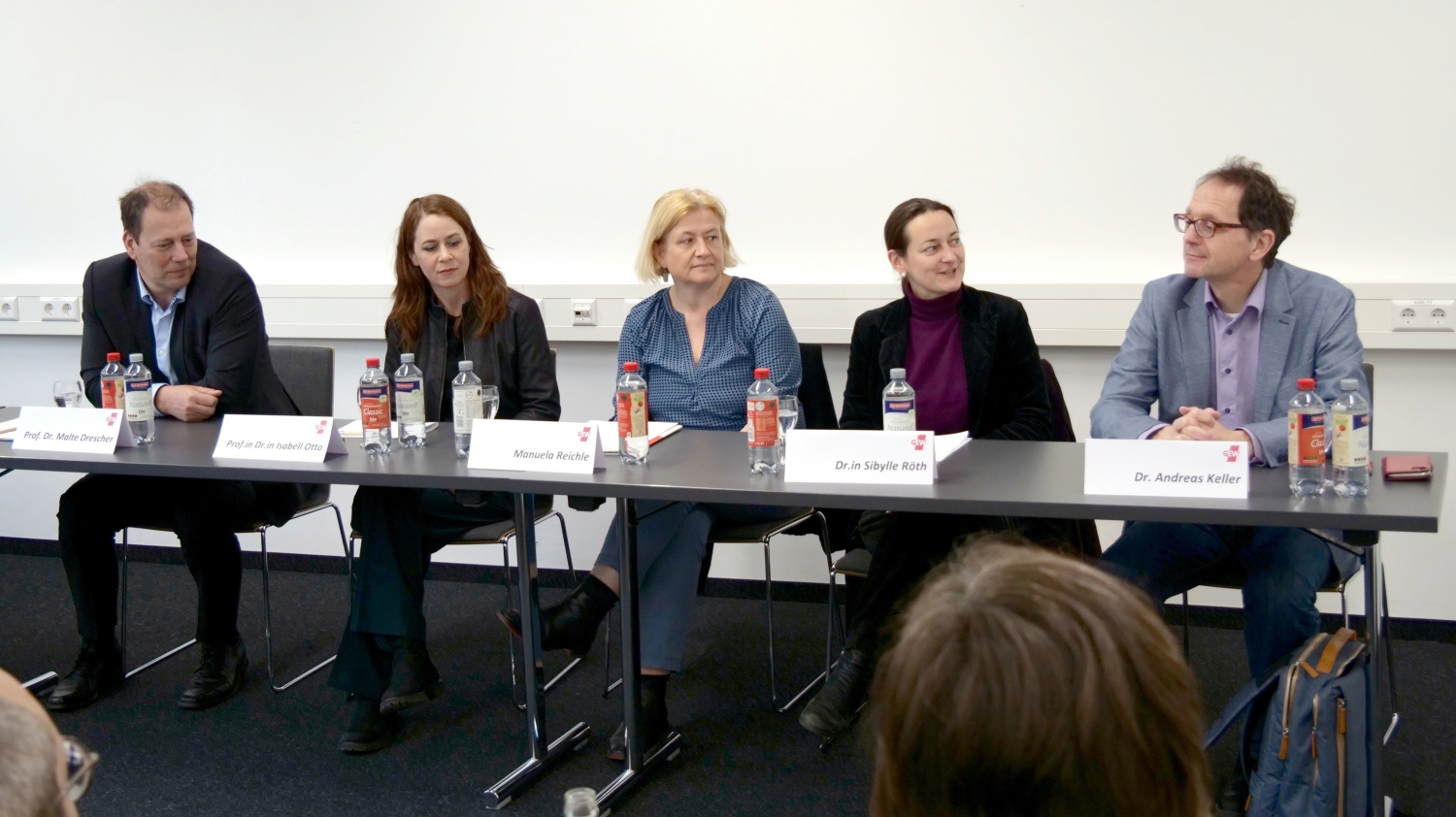Career paths must become more reliable

"It doesn't matter whether or not reforms come: The important thing is what each university makes of the situation", said Andreas Keller (union GEW) on 24 April 2024 at a podium discussion organized by the Mittelbau-Initiative Konstanz and the GEW union for education and research. The reforms mentioned are related to the new German law on academic fixed-term contracts (WissZeitVG). In this context, the University of Konstanz created its own model "Attractive and reliable career paths for excellent researchers" which was the subject of the evening's discussion.
On this occasion, Andreas Keller was joined by additional experts: Malte Drescher, Isabell Otto and Sibylle Röth. The moderator was Manuela Reichle (coordinator for higher education and equal opportunity policy at the union GEW in Baden-Württemberg).
© University of Konstanz
Malte Drescher began the discussion by stating that one of the strengths of a reform university lies in its ability to try out new things and thus drive innovation. This is how the concept "Attractive and reliable career paths for excellent researchers" was developed in Konstanz. At first, Drescher gave a brief explanation of each part of the title before diving into the details of how the model is structured and explaining its three parts (for doctoral researchers, postdocs and long-term career options) with a total of 21 measures.
Malte Drescher highlighted the concept's participatory nature as an advantage. The first step is to ask the departments about their specific needs, since they can vary widely.
Isabell Otto added that, in upcoming weeks, the Rectorate will be speaking with each individual department to find out about their subject-specific requirements for career paths. Sibylle Röth agreed that the concept's strength is especially evident in the departments' ability to contribute to the process, but then added: "Some departments are unsure about how to implement all of this. So, we will have to wait and see how things develop."
The model addresses the need to provide better conditions for researchers in early career phases. Isabell Otto says it should also promote equal opportunity and diversity. This is why the process takes place in close collaboration with the university's Academic Staff Development team and the Equal Opportunity Office, and the plans will continue to develop further as things progress.
Andreas Keller contributed his country-wide perspective on the planned new German law on academic fixed-term contracts. He pointed out that plans to shorten the contract period for postdoctoral researchers from six to four years (with an extension option) would increase pressure on postdocs – as long as this does not go hand-in-hand with a binding offer to extend the contract period if the researchers fulfil set criteria. In addition, he explained details of the law under discussion and summarized the reform plans.
"This is how we aim to ensure that certain groups are not favoured over others, for example, researchers with care or family responsibilities will not be put at a disadvantage."
Isabell Otto
Andreas Keller added that it was necessary to establish additional permanent positions alongside professorships: "They should not just be like "consolation prizes", but rather significant roles, because professors are not the only ones engaging in research and teaching". To establish such permanent positions it is necessary to change existing structures so that staff positions are not assigned to a certain professorship but rather to a department. Malte Drescher explained that, to a great extent, the University of Konstanz is already structured in this way. Many staff positions are already assigned to a department instead of an individual professor. At the same time, positions for professors are still necessary in order for the university to remain competitive. This is because, during appointment negotiations, many professors also want the university to commit to funding the positions assigned to them.
For Sibylle Röth, the concept provides options but not requirements. "I would have preferred a binding target quota that would make it possible to measure the results", she said. Malte Drescher replied that the goal was not to reach a fixed quota of permanent positions but rather to create optimal conditions for an excellent university. Establishing permanent positions would not be useful for every department. Isabell Otto added that the main goal should be enabling qualifications, such as the habilitation (postdoctoral qualification). Andreas Keller, however, was in favour of quotas, which in his opinion do not have to be general, but could be specific to each department.
The panel participants at a glance:
- Malte Drescher: former Vice Rector for Research at the University of Konstanz who initiated the model; President of RPTU Kaiserslautern-Landau starting 1 October 2024
- Isabell Otto: Vice Rector for Diversity and Academic Staff Development at the University of Konstanz
- Sibylle Röth: co-speaker of the Konstanz initiative for non-professorial academic staff (Mittelbau-Initiative Konstanz)
- Andreas Keller: vice manager of the board at the national level for the union GEW and leading board member for the area of higher education and research
- Manuela Reichle (moderator): coordinator for higher education and equal opportunity policy at the union GEW in Baden-Württemberg

